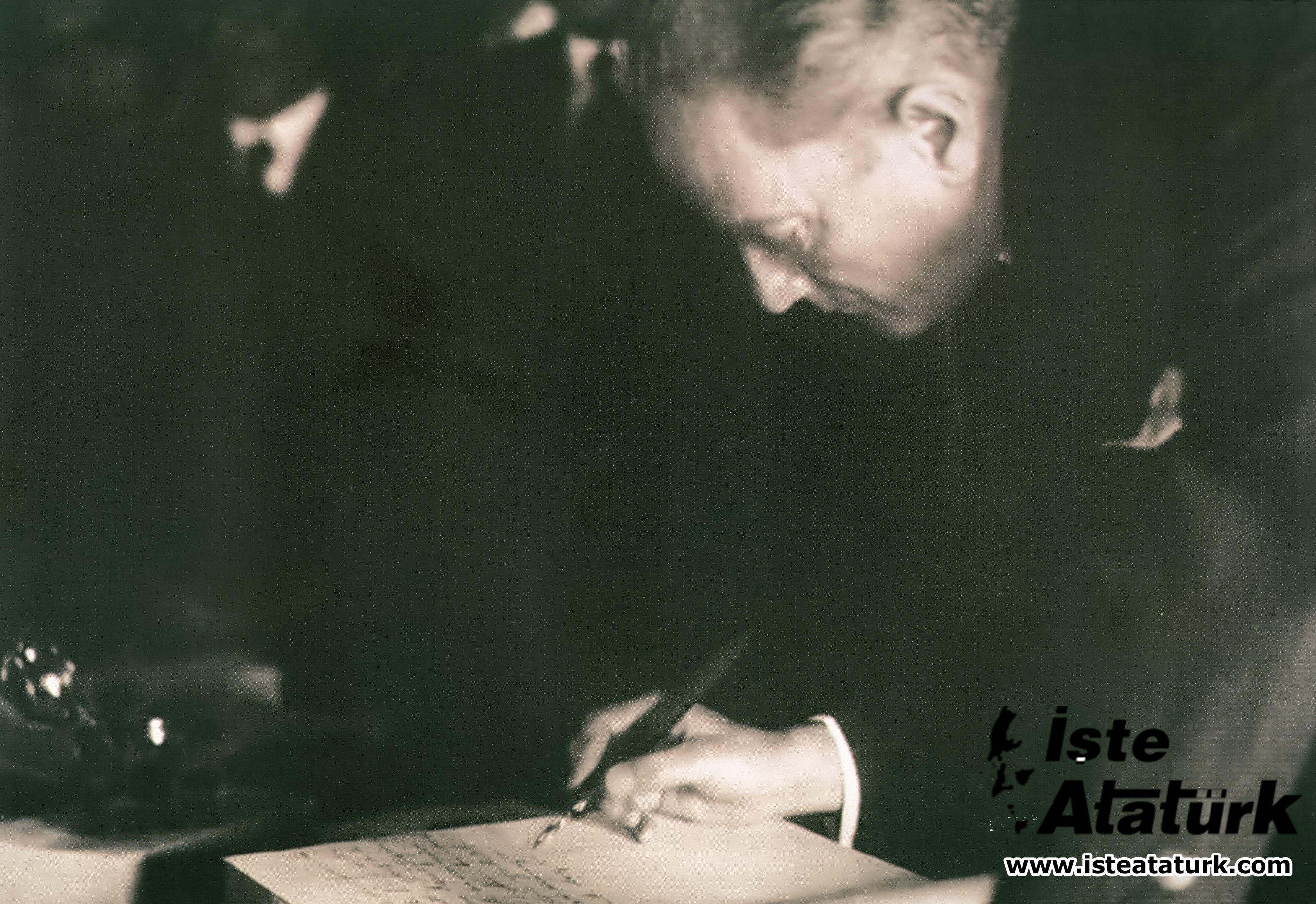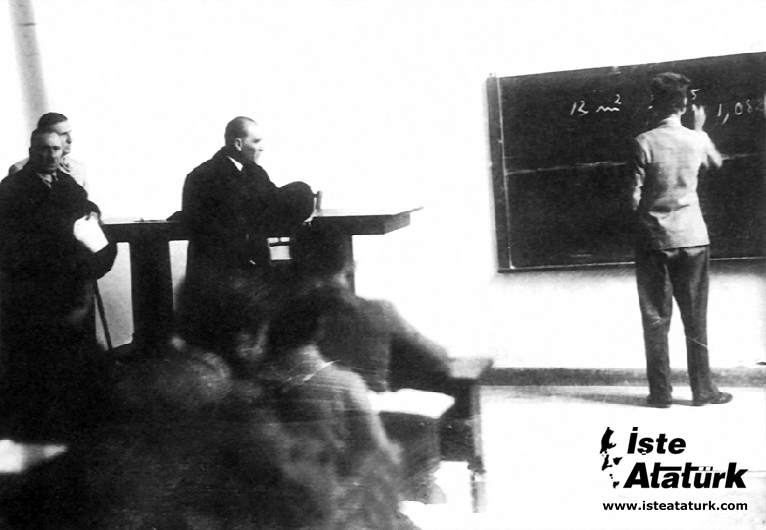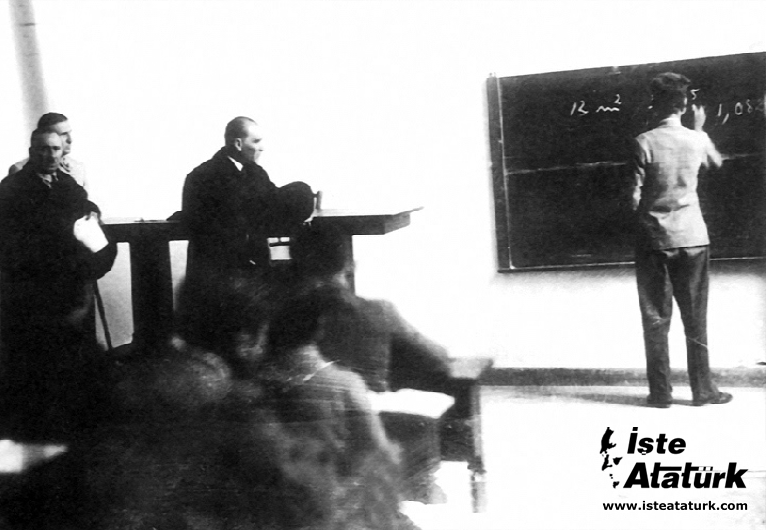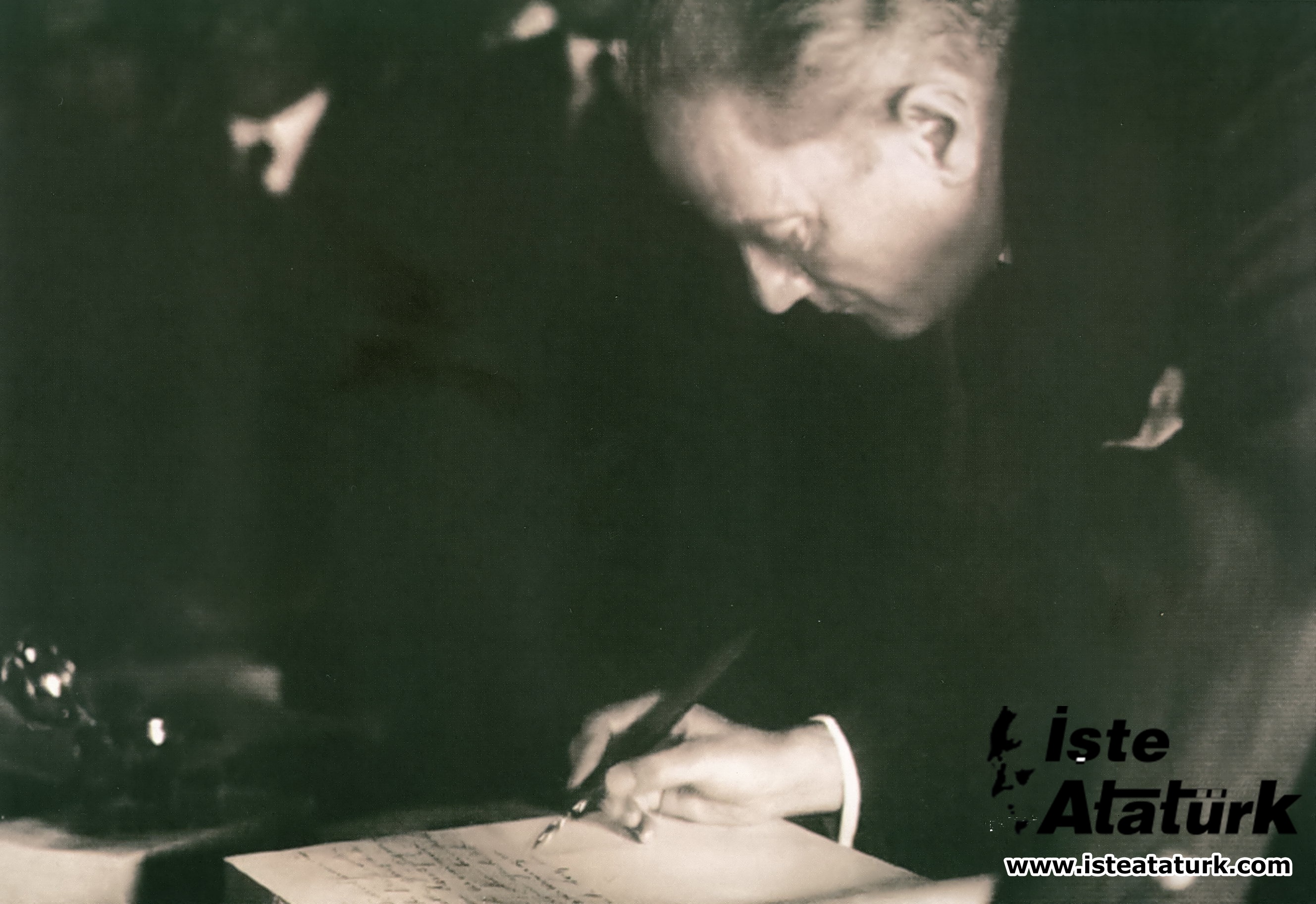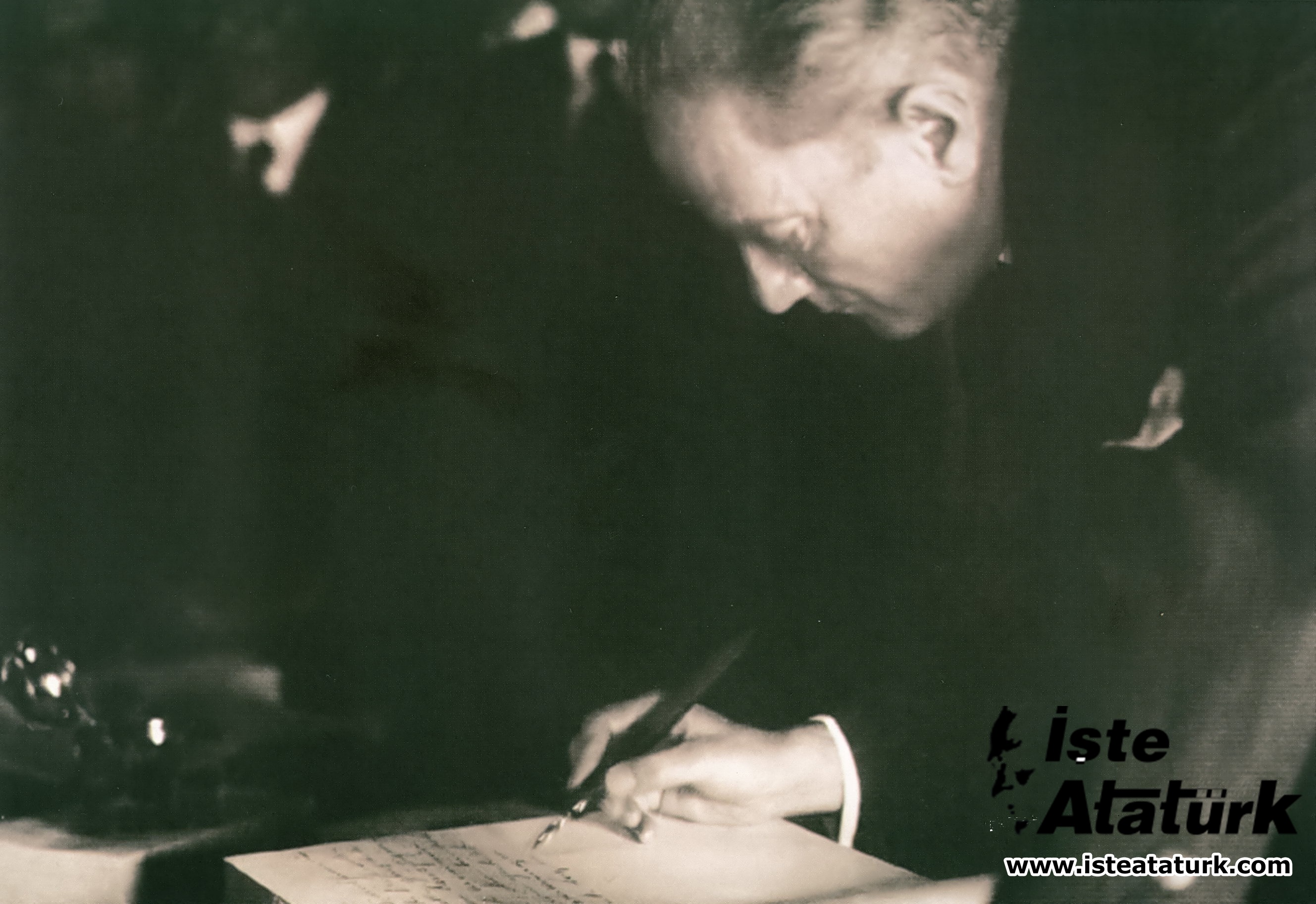
Atatürk's Law Revolution
Character Size
Atatürk's Law Revolution
ATATÜRK'S LEGAL REVOLUTION
Social Norms:
While stating and defining the meaning of law, we can approach the subject in terms of sociology as well as legal science. When we talk about a legal revolution or revolution, of course, it will be necessary to approach the subject from a sociological perspective. In terms of legal science, there is not much difficulty in determining the meaning of law and making its definition. Indeed, only in terms of legal science, law is a technique. In this respect, a revolution in law can mean a radical change in technique.
However, in terms of the sociology of law, law is first and foremost a social phenomenon; It is a social formation. A human society with a certain degree of breadth can be considered and analyzed as a social system in terms of social science. In general, we understand the concept of system as a whole consisting of different parts, that is, structural elements that are interconnected.
The concept of “Social System” can also be determined within the framework of the same definition. The system in question regulates the relations between the individuals who make up the society, both with each other and between the individuals and the group, that is, the society. Since human society can be considered as a bundle of social relations, all relations take place according to this system. Social systems consist of a number of structural elements. The most important among these are social norms.
Social norms are the rules and authority standards that organize the attitudes and actions of people and groups in social life. Thus, social norms consist of standards and examples that are shared by members of a social group, expected to be obeyed by everyone, compliance is provided with positive and negative sanctions, and non-compliance is met with sanctions.
The survival of a society depends on creating these social norms and changing them when necessary. Everything in social life takes place according to these social norms. In this respect, norms can also be defined as cultural definitions that determine expectations.
A complex, large-scale society cannot operate without norms, and an important feature of contemporary society is the complex nature of norms. Because in today's complex societies, social organizations are numerous and they must have their own specific types of norms.
Rules of law:
Law rules constitute a very important group among the social norm categories. We call legal rules the category of social norms whose deviation from them is met by the rationally organized sanctions, that is, by the use of force, by the society and the state, which constitutes its political organization.
Basic Features of Law Rules:
Rules of law have two basic features compared to other norm categories: These rules are "recognized and accepted" by the state, in other words, by the political organization of the society. In other words, the rules of law carry an authority arising from the will of the state. The state applies these rules through its courts and other authorities in response to certain situations. The application of the rules necessarily requires their interpretation.
Another basic feature of the rules of law is that they are in a generalized and systematic structure that reflects the structure of a particular system, with a logical harmony between them. Legal rules form parts of a system as a whole. Thus, it is possible to determine the basic feature of these norms, which consist of the harmonious rules of a certain basic system, that allows them to distinguish themselves from other social norms.
Legal Systems:
These rules pertaining to very different areas of life can reflect completely different legal systems. Thus, for example, we can talk about the Anglo-Saxon legal system, the Common Law system, the Continental (Continental) legal system, Islamic law, canon law, and socialist law.
When the law thus constitutes a system and the rules of law form the parts of the system, it becomes necessary to have a set of fundamental (maintainer in the old saying) principles of law, as well as for every system, and a harmony between the rules and these principles. These principles find their expression among the main sources of law:
Islamic law finds its basic principles in the Qur'an, hadiths, ijma-i ummah and qiyas fuqaha. For this reason, the rules that the state will recognize and accept in Islamic legal systems and that it will put its own power and authority behind can in no way be contrary to the provisions of the legal sources we have mentioned and the principles contained in the mentioned sources. From this, the rule of superiority of the sharia law emerges. On the other hand, in secular and democratic western law, the main source of law is the national will. Within the framework of representative democracy, the national will is represented by the parliaments, which are temporarily elected according to the constitution created by the nation, and which must set the rules of law according to the basic principles of this constitution. Constitution so that society as a whole, It is a social contract created by all individuals and the real owner of sovereignty is the nation. However, in religious legal systems, the owner of sovereignty is Allah and he is the greatest lawmaker.
In socialist legal systems, however, only the will of the employees is respected, not the national will. In the socialist legal system, the concept of national will is a deception, and in reality, sovereignty should belong to the working class. From here, the concept of dictatorship of the proletariat emerges in systems claiming to be communist.
Legal Revolution:
It may be possible to talk about a legal revolution and sometimes a legal revolution when the law changes this basic system feature and quality that we have mentioned.
The great social event that we call “Atatürk's legal revolution” constitutes a real legal revolution because of its characteristics that we have just explained. Because Atatürk's legal revolution expresses the abandonment of the basic sources and principles on which the old law is based as a system, the acceptance of the basics and principles of western law as a system, and most importantly, the adoption of the western legal mentality, and for this reason, it is a real revolution. In this respect, it is broadly different from the initiatives and reform movements carried out in accordance with the western model in the field of law since the Gülhane Hatt-ı Hümayunu. Although, some have understood Atatürk's legal reform as the quoting of some western laws since 1926. It is for this reason that Some reformers have always taken a negative attitude against the need for changes in these laws that have arisen in the course of time, for example, they have considered the changes envisaged to be made in a civil law as a deviation from Atatürk's legal reform. However, the citation of foreign laws, that is, the "reception" event is a very common phenomenon among states in history. We will deal with this subject below.
Ataturk's Legal Revolution and National Sovereignty:
Within the framework of the explanations we have made above, the biggest change that Atatürk's legal reform made in terms of the basis of the legal system is the acceptance of the concept of national sovereignty as the basis of law. In fact, in 1876, a constitution (Kanun-u Esasi) was created in order to make the state respect the law and to enter the path of rule of law. It is certain that this movement represents a stage in terms of the establishment of the concept of the rule of law. However, this constitution did not agree with the principle of national will and did not express a legal revolution in terms of its provisions that we will cite below. In fact, it is stated in the 3rd article of the 1876 Kanun-u Esasi: “The Caliphate of the Sultanate-i-Osmaniye-i Osmaniye Kübra and the Islamic family belonged to the elder son in an archaic way”.
Article 4: “His Excellency the Sultan hasbel is the protector of Islam, the religion of caliphate, and the Sovereign and Sultan of Osmaniye as a whole”.
Article 5: “The Self-Humayun of His Excellency the Sultan is sacred and irresponsible”.
Article 7: It includes the “Hukuk-u-sacred Sultan... the execution of the Law of the Law and the Law...”.
Article 17: “The peace of the Ottomans in the cafe is equal in law and in the law and status of the country, apart from the religious and sectarian conditions”.
Article 87: “Visiting is observed in the court of Deavi-i Şer'iye and in the court of deavi i nizamiye.”
These provisions show that compliance with the ahkâm-ı şeriye continues to be the basic principle of law.
Here, with the Republic, the main concept that will constitute the basis and source of law has been changed, and thus, a system change in law has been carried out, paving the way for a genuine legal revolution. As explained above, this is the basic concept that characterizes contemporary republican law, national sovereignty. From the beginning of the War of Independence, the theory of national sovereignty was actually accepted and it was stated implicitly at the beginning and openly after the establishment of the Republic that the sole and sole owner of the sovereignty was the Turkish nation. Article 6 of our current Constitution states that “Sovereignty belongs unconditionally to the Turkish nation”.
The Meaning of National Sovereignty Today:
As it is known, sovereignty has two aspects in law: External sovereignty expresses the independence of the state and its equality with all other states. In the War of Independence, when the Turkish nation shouted the slogan "either independence or death", it declared the state's full independence to the whole world. Internal sovereignty, on the other hand, refers to the supreme and supreme power of the state within the borders of the country, which cannot be shared with any institution, cannot be transferred, is essential, unconditional and unconditional. However, this power is not arbitrary; it is registered with the rules of law and primarily the provisions of the constitution. Among the main views put forward historically in terms of explaining the origin of state power, the basis of the new Turkish State was national sovereignty. The very short meaning of national sovereignty is as follows: The only legitimate source and owner of sovereignty is the nation. Administrators can only have the authority to exercise sovereignty. As such, sovereignty can only be exercised by the representatives of the nation. Thus, national sovereignty is combined with the principle of national representation.
In our country, the concept of national sovereignty emerged with the War of Independence and the concept of national sovereignty prevailed in all constitutional texts that came into force as of January 20, 1921.
Understanding of National Sovereignty in 1961 and 1982 Constitutions:
However, there are fundamental differences between the understanding of the representation of national sovereignty in the constitutions created after the National War of Independence and the understanding of national sovereignty in the 1961 and 1982 constitutions:
The constitutions of 1921 and 1924 recognized the Turkish Grand National Assembly as the sole representative in the exercise of sovereignty. Thus, a situation emerged that integrated and identifies the will of the people based on parliamentary supremacy and the will of the parliament. The powers of such an assembly cannot be restricted; because to restrict the will of the parliament is to restrict the will of the nation. It should be noted that, based on the view that the unrestrained will of the Great Assembly, which won the War of Independence, is also manifested in today's Turkish Grand National Assembly, for example, there are opinions pointing out that the decisions of the Constitutional Court have been criticized, and that limits have been set on the will of the people with the decisions of the court. However, the understanding of sovereignty in the 1961 and 1982 constitutions is different from the previous ones: Sovereignty undoubtedly belongs to the Turkish Nation unconditionally and there is no change in this regard. So sovereignty cannot be shared by any power or might. No person can use the powers of sovereignty by putting himself in the place of the nation, and cannot claim that he has such a talent. The absoluteness of sovereignty with its unique characteristics is manifested in the nation, which is its sole owner. However, there are records in the use of sovereignty on behalf of the nation, as for any authority. These records find their expression in the clear provisions of the Constitution: The absoluteness of sovereignty with its unique characteristics is manifested in the nation, which is its sole owner. However, there are records in the use of sovereignty on behalf of the nation, as for any authority. These records find their expression in the clear provisions of the Constitution: The absoluteness of sovereignty with its unique characteristics is manifested in the nation, which is its sole owner. However, there are records in the use of sovereignty on behalf of the nation, as for any authority. These records find their expression in the clear provisions of the Constitution:
a) First of all, according to Article 2 of the Constitution, the Republic of Turkey is a state of law. In the state of law, every authority can be used within the limits set by the law.
b) According to the Constitution, a state power that does not derive its source from the Constitution cannot be exercised. This means that every authority exercised on behalf of the nation must find its source in the Constitution.
c) 6/2 of the Constitution. According to the article, “The Turkish nation exercises its sovereignty through the authorized bodies in accordance with the principles laid down by the Constitution”. This means that the sovereign powers will be exercised by the organs that are specified in the Constitution and that are limited in a way, within the limits required by the state of law.
d) The sovereignty of the state is exercised in the legislative, executive and judicial fields in terms of state activities. II of the Constitution. Article 1 of the Constitution provides the following provision: “Constitutional provisions are the basic legal rules that bind the legislative, executive and judicial organs, administrative authorities and other institutions and individuals. Laws cannot be contrary to the Constitution”. This provision clearly states that the provisions of the Constitution constitute definite limits in the exercise of sovereignty and that the use of sovereignty on behalf of the nation will be exercised within the limits drawn by the Constitution.
Atatürk's legal reform, of course, made sense of the national sovereignty view according to the conditions and needs of Turkey at that time.
This view still persists today. However, today, the situation is different according to the concept of national sovereignty, or rather the characteristics of the use of national sovereignty. Let us emphasize that there is no difference between the basic principles of Atatürk's legal reform and the principles that should be governed by the expression of national sovereignty in the Constitution today, and the 1982 Constitution still maintains the principles of Atatürk's legal reform.
Basic Function in Atatürk's Legal Revolution:
Before mentioning the second fundamental system change, which expresses the definition of Atatürk's innovations in the field of law as a revolution, we would like to point out a very important function of law in Atatürk's legal reform. We can state this as the fact that the law has been used as a guarantee for all social change movements. Our legal revolution does not only mean the establishment of a state in the contemporary sense, the orientation of our social life in the direction of the lifestyles of the nations living within the framework of contemporary civilization, and the transformation of our social order from the traditional society form to the modern industrial society system.
The question today is whether such guarantees or sanctions still need to function today. In fact, this is the basis of the discussions on some articles of the Turkish Penal Code. The legal reform played the role of being an effective tool in eliminating the existence of all other reforms and the resistances that are considered natural in sociological terms. In our opinion, it continues in this role today. For this reason, there is no mistake in stating that the legal revolution provides both the necessary condition and the assurance of the continuation of the innovations realized in all other fields.
Quoting Western Laws:
We have explained above what should be understood from the legal revolution. The fact that some western laws were quoted and put into effect in 1926 and the following periods, the Civil Code, Criminal and Procedural Laws, and the Commercial Code were quoted from the west and put into effect, of course, is a great event and an important innovation in terms of social life. ; It is a great social change proposal. The laws in question are among the tools used in order to enable the society to move to a new level of life. However, it is not enough to define the adoption of these laws as a legal revolution. Because in our country, the act of quoting foreign laws was started after the second half of the 19th century. Criminal law, procedural laws,
Liquidation of Nasism:
Of course, it should be noted that Western laws were quoted together, almost as a package, in a very short period of time, which has a special meaning. This meaning refers to the transition from the traditional eastern approach to the contemporary approach in law without making any concessions and the determination in this regard. The event has great meaning in this respect and should be the subject of sociological analysis. However, these laws were changed over time in the countries that created them, and they have undergone fundamental changes in our country, too, due to the force of events and the pressure of local needs. Today we want to change the Civil Code on a very large scale, and our work to replace the Penal Code with a new law inspired by the current realities of Turkish society has come to an end.
As we pointed out above, the important thing is a change of approach: The new approach, which we connected the legal revolution and changed the system, was to make the contemporary western understanding of law a motto in legislation and practice, and this is one of the cornerstones of Atatürk's legal reform. This understanding is to eliminate nassism as the basis of law and legal sources and to take national sovereignty as a basis. As such, the legal revolution states that the source of inspiration for law should be only life and its necessities, and for this reason, it is necessary to comply with and preserve the superior legal principles and measures accepted by civilized countries as dominant principles. Contemporary legal mentality, while the written rules of law are being created, the superior legal and human values common to civilized countries, it orders to consider the current and future needs of the society and to comply with the requirements of the positive science mentality and philosophy. The arrangement of the legislation according to the current and future needs of the society and its change over time is a requirement of this mentality. Such an attitude does not mean the denial of all principles and acting opportunistically according to time and space. Because in modern civilized countries, common law now has superior principles and concepts that are clearly expressed in international law documents, human rights declarations and conventions; The law of any country that claims to be civil to them will comply. The nass will not prevent them from being obeyed. The arrangement of the legislation according to the current and future needs of the society and its change over time is a requirement of this mentality. Such an attitude does not mean the denial of all principles and acting opportunistically according to time and space. Because in modern civilized countries, common law now has superior principles and concepts that are clearly expressed in international law documents, human rights declarations and conventions; The law of any country that claims to be civil to them will comply. The nass will not prevent them from being obeyed. The arrangement of the legislation according to the current and future needs of the society and its change over time is a requirement of this mentality. Such an attitude does not mean the denial of all principles and acting opportunistically according to time and space. Because in modern civilized countries, common law now has superior principles and concepts that are clearly expressed in international law documents, human rights declarations and conventions; The law of any country that claims to be civil to them will comply. The nass will not prevent them from being obeyed. has superior principles and concepts that are clearly expressed in human rights declarations and conventions; The law of any country that claims to be civil to them will comply. The nass will not prevent them from being obeyed. has superior principles and concepts that are clearly expressed in human rights declarations and conventions; The law of any country that claims to be civil to them will comply. The nass will not prevent them from being obeyed.
Here, the fundamental difference between the 19th century's movement to cite the western laws and Atatürk's legal reform is the fundamental difference in approach we mentioned. When the French Penal Code, which constituted the penal code of a Christian state, was quoted by the Ottoman Empire as the "Cenal Code of Criminal Procedure" in 1856, it was stated in the first article that the law showed the tazirat law belonging to the Caliph and that the rules of the law were reserved. While it was taken, a thought that rejected the western legal mentality and was in contradiction with it was immediately placed in the first article of the law. In Atatürk's legal movement, the rejection of such concessions constitutes the main approach directive.
Placing the Legal Revolution:
Actual law is the law that is actually practiced. Practice gives form to law. For this reason, in order to reach a contemporary understanding of law in terms of practice, it was necessary to raise a generation of jurists who had the mentality required by the common law of civilized nations. This, of course, is a matter of time and opportunity. At this point, Atatürk's perceptive and realistic identity shows itself: For this purpose, Atatürk gives priority to raising a new generation of lawyers above all else and states the following in his speech at the opening ceremony of Ankara Law School: The negative and dire force, which has finally ennobled and eclipsed the connoisseurs of enterprise, the connoisseurs of zealotry, and the connoisseurs of sacrifice, have been the law in your hands until now and its sincere opponents. I am sure that perhaps my heavy and brave historical observation will not surprise anyone among your distinguished committee and among our esteemed officers and judges, whose services the Republic government is using today... I am exposed”. It is understood from these statements that Atatürk really wants a revolution in law. It aims to leave the old law aside in terms of its foundations and principles and to move to a new legal system based on brand new principles. If I try to give an example of the difficulties that the old law and its followers have brought to me in our new revolution period, I will be exposed to the danger of approving you”. It is understood from these statements that Atatürk really wants a revolution in law. It aims to leave the old law aside in terms of its foundations and principles and to move to a new legal system based on brand new principles. If I try to give an example of the difficulties that the old law and its followers have brought to me in our new revolution period, I will be exposed to the danger of approving you”. It is understood from these statements that Atatürk really wants a revolution in law. It aims to leave the old law aside in terms of its foundations and principles and to move to a new legal system based on brand new principles.
Those who have experience in law know that a lawyer gains maturity according to the legal system in his country and carries the mentality required by that system. As a matter of fact, those who oppose Atatürk by mentioning the requirements of the old law in the reform movements he wanted to initiate did nothing but express the mentality of the lawyers they were trained in. However, Atatürk, with his great genius, saw that the lawyer was one of the basic elements of social development, and in this respect, he wanted to express the vital importance of educating lawyers with the mentality suitable for the new legal order. As a matter of fact, in the speech he gave in the Turkish Grand National Assembly on March 1, 1924, he pointed out this point: It is to save as soon as possible from the nexuses that are inconsistent with the requirements of the century that have an unconscious influence”. The clear meaning of this phrase is to move to a new legal system and to dominate the mentality that it necessitates. In this respect, the most important principle is to eliminate Nasrism and to be subject to the national will. Atatürk expressed the necessity of fighting against Nazism in his Great Speech as follows: “I was personally presiding over those who prepared the first Teşkilat-ı Esasiye Kanunu. A lot of effort was made to explain that there is no relation between the law and the law that we are making. However, it was not possible to convince those who wanted a different meaning from this term in their own opinion”. In this respect, the most important principle is to eliminate Nasrism and to be subject to the national will. Atatürk expressed the necessity of fighting against Nazism in his Great Speech as follows: “I was personally presiding over those who prepared the first Teşkilat-ı Esasiye Kanunu. A lot of effort was made to explain that there is no relation between the law and the law that we are making. However, it was not possible to convince those who wanted a different meaning from this term in their own opinion”. In this respect, the most important principle is to eliminate Nasrism and to be subject to the national will. Atatürk expressed the necessity of fighting against Nazism in his Great Speech as follows: “I was personally presiding over those who prepared the first Teşkilat-ı Esasiye Kanunu. A lot of effort was made to explain that there is no relation between the law and the law that we are making. However, it was not possible to convince those who wanted a different meaning from this term in their own opinion”.
It is necessary to understand Atatürk's complaints well: Atatürk was aiming to change the structure of Turkish society from traditionalism to mobility, and to transfer Turkish society to a modern life level and social system. It aimed to transform an agricultural society whose economy was based on a traditionalist, social change slowed down and primitive agricultural technology into an industrial society, so that Turkish people would reach the level of prosperity they deserved and escape from the exploitation of the West. This is the goal of all Turkish revolutions. However, such a goal cannot be achieved with a law based on hypocrisy. The goal of a Nassist law is to create a stable society and to imprison the social system within its traditional character. Such a law closes society to innovations; at least greatly complicates innovation. However, the main goal of Atatürk's reforms was to raise Turkish society to the level of a modern civilized society, that is, to completely change the traditional social system. As such, a new law based on the national will and the national representation system, rejecting Nasrism, and the mentality required by it, constituted the essential basic condition of all Atatürk's reforms.
This is the reason why Atatürk complained about the legal mentality and those who represent this mentality, which tried to prevent movements that are based on reality in the field of law and that form the foundations of modern civilization. What Atatürk did in order to save the law from the old legal system and its mentality, which, considering conservatism as a fundamental value, advised to stop innovation and use it to maintain a static society level, is this real legal revolution. The basic character and function of contemporary law within the framework of Atatürk's reform is not to preserve the society as much as possible and to make a static social system dominant, but to open up innovation paths by providing a movement system to the society and people. It is to eliminate the elements that block innovation.
The essential condition of establishing national sovereignty by freeing the law from nassism is to accept and establish the principle of secularism as the unchangeable quality and characteristic of the state. Atatürk's revolution clearly and distinctly determined that the reform movements that were attempted to be carried out since the 1839 Tanzimat could not lead to the desired results unless the principle of secularism was fully established.
It is for these reasons that the way to the dominance of secularism in state life and law has been cleared in a very smart and planned way. The principle of laicism entered the Teşkilat-ı Esasiye Kanunu, in word and text, in 1937. However, secularism in the real sense has been applied in the state life since the 1924 Teşkilat-ı Esasiye Law came into force. In 1928, the provisions stating that the religion of the state was Islam and that the Turkish Grand National Assembly was obliged to enforce the Sharia were abolished by defining the references to religion in the President's oaths of the deputies as "zevait" (unnecessary excess). In the justification for this amendment made in the Constitution in 1928, it was stated as follows: “...
If we want to end this article with a summary, we will say: The legal revolution actually means a fundamental change in the legal system. A change in the legal system means a change in the main sources and basic principles of law. The structural change in Atatürk's law is that national sovereignty is the main source of law. This principle necessarily requires the elimination of Nasrism. The means of eliminating the nassism in law is the acceptance of laicism. Then, as it was yesterday, the Turkish nation's clinging to the principles of national sovereignty and secularism is the basic condition for achieving the goal set by Atatürk. This is also the requirement of loyalty to Atatürk's reforms and the basic condition of our independence and national happiness.
Ord. Prof. Dr. Sulhi Dönmezer
Source: ATATÜRK ARAŞTIRMA MERKEZİ DERGİSİ, Sayı 18, Cilt: VI, Temmuz 1990
